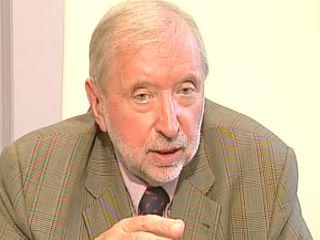
I remember an experience from the Yugoslav crisis, during a confrontation with Milošević. The official Slovene politics at the time believed a political solution was necessary, which would not be credible without a military threat. And the second experience I would like to mention: those who claimed that the happenings in Iraq were actually about the »regime change« should be clearly told that the »regime change« was in question also when dealing with the Milošević's state.
minister Dimitrij Rupel, who believes the solution "will be reached with the help of a credible threat of military intervention".
During his rich diplomatic career Dimitrij Rupel gained experience with the Iraqi war as well – he was, after all, the person who signed the Vilnius declaration by which Slovenia joined the attack on Iraq. As a number of international experts compare the USA threats of attack on Syria to the attack on Iraq, and Serbia as well, we were interested in his assessment of the events, and his opinion regarding the side Slovenia should support.
Do you support the USA's decision for military intervention in Syria due to alleged use of chemical weapons?
At the moment we still do not know what the USA will do. There, and actually everywhere, caution prevails due to negative experiences from interventions in Iraq, Libya, etc. Besides that we should all be worried about the kind of politics that will succeed Assad's, and about the reactions which might be triggered within the radical Muslim communities by the showdown with the present politics.
What turn would the story take in case UN inspectors establish it had been the rebels who had used the chemical weapons?
If it turns out that the Syrian rebels are no better than the regime, the fact would most certainly damage the moral segment of the argumentation on which the intervention is based.
How do you comment the fact that in this conflict the West is supporting the Sunnis – EU even lifted the embargo on arming rebels with no connection to al Qaeda?
The support to Sunnis is, of course, a big problem. As already mentioned, it should be established which of the politics guarantees the higher level of democracy and protection of human rights.
The Slovenia's standpoint concerning the Iraq and the Afghanistan wars is known; which role shall we play in this conflict?
Slovenia has several options. We are members of the EU and NATO, therefore we can expect solidarity and coordination. On the other hand, we are a sovereign country. In view of our economic position it would be sensible to take into consideration the countries which are likely to support us, and expect our support in return.
Some predict that an attack on Syria might spark a fire in the Middle East. Barack Obama seems to have some impediments regarding the intervention in Syria – who would benefit most from the attack? The alleged use of the chemical weapons appears to be just a cover for another story …
Obama carries the largest responsibility, and his restraint is understandable. As far as Syria is concerned, we might say that it has already been sparking a fire in the Middle East, thanks to Assad. I would like to repeat that the political solution will be reached with the help of a credible threat of military intervention.
What are your predictions?
I hope that our side remains sensible, and that Assad will fall, as other tyrants have fallen.
I remember an experience from the Yugoslav crisis, during a confrontation with Milošević. The official Slovene politics at the time believed a political solution was necessary, which would not be credible without a military threat. And the second experience I would like to mention: those who claimed that the happenings in Iraq were actually about the »regime change« should be clearly told that the »regime change« was in question also when dealing with the Milošević's state.

































































